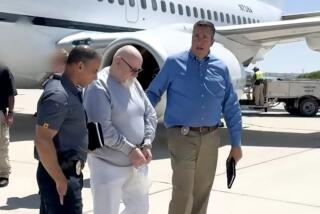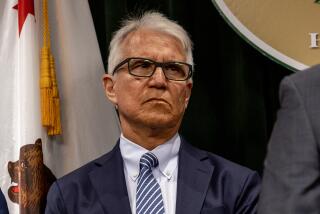Chester Turner, serial killer on death row, is charged with four more murders
- Share via
Chester Dewayne Turner, one of Los Angeles’ most prolific serial killers who prowled the streets of South L.A. in the 1980s and ‘90s, was charged Tuesday with four additional murders linked to him through DNA.
The charges were filed after a DNA test recently connected Turner to the 1997 slaying of Cynthia Annette Johnson, whose killing had been considered cleared by the LAPD after the arrest and unsuccessful prosecution of another suspect. A department criminalist inadvertently included evidence from the Johnson case for testing last year as part of the LAPD’s effort to reduce the backlog of untested sexual assault kits, Det. Cliff Shepard said.
The remaining three murder counts stem from killings in which authorities long suspected Turner but never filed charges against him.
In two cases, another man was wrongfully convicted and spent 11 years behind bars until his release in 2004, when DNA linked Turner to the killings. In the fourth case, DNA connected Turner to the case after he had been charged with multiple killings in 2004. All four of the victims were strangled.
Turner, 44, was sentenced to death in 2007 for the murder of 10 women, one of whom was 6 1/2 months pregnant.
“He needs to be held accountable for what he did,” said L.A. County Deputy Dist. Atty. Robert Grace, who helped prosecute Turner. “It’s very important for everyone in the city, particularly those in South L.A., that the justice system does value the lives of people killed.”
Turner’s attorney, John Tyre, questioned the decision to file new charges when his client is already on death row. “We need to spend our money on better places than trying to put someone to death twice,” he said.
Turner, a one-time pizza deliveryman, was one of at least five serial killers who roamed South L.A. in the 1980s and ‘90s. Most of his victims were raped and strangled.
In the latest filing, prosecutors allege that Turner was responsible for the killing of Johnson, 30; Elandra Bunn, 33; Mary Edwards, 41; and Debra Williams, 32.
Johnson’s body was discovered in an alley near an African Methodist Episcopal Church on Central Avenue and 105th Street.
Within months, police made an unrelated drug arrest of two men in a crack house. One of the men told detectives that his associate had confessed to the killing.
William Johnson, no relation to the victim, later testified in court that he saw Rodney Lavell Greene walk away with the victim toward the church on Central Avenue shortly before the killing. Later, William Johnson said, he and Greene were smoking crack cocaine when Greene confessed that he had beaten the victim and killed her with a baseball bat because she had refused to have sex with him.
But the coroner’s office said that the victim had been strangled, most likely with the killer’s hands, not a bat, and that there was no evidence she had been beaten. Greene’s attorney, Bruce L. Karey, said prosecutors dropped the murder charge on the day of Greene’s trial.
But the case was considered cleared by the Los Angeles Police Department until last year’s genetic test linked the killing to Turner.
As with Cynthia Annette Johnson’s slaying, police came to suspect someone other than Turner in the 1992 killings of Edwards and Williams.
Detectives discovered that David Allen Jones, a part-time janitor, had been charged with the attempted rape of a woman near where three slaying victims, including Edwards and Williams, had been found.
After denying that he killed the women, Jones, under detectives’ prodding, admitted to having sex and smoking crack cocaine with them. A psychiatrist described Jones as having the mental capacity of an 8-year-old. Jones was convicted in 1995 of killing the three women and was sentenced to 36 years to life in prison.
He was released in 2004 after DNA tests exonerated him and implicated Turner in the Edwards and Williams killings. Shepard, the lead LAPD detective on the Turner case, said that Turner is a suspect in the third slaying — and three others — but that evidence from those crimes has been destroyed.
More to Read
Sign up for Essential California
The most important California stories and recommendations in your inbox every morning.
You may occasionally receive promotional content from the Los Angeles Times.










